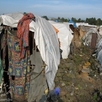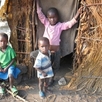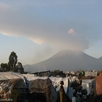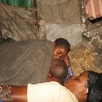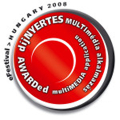Travelogues
Africa makes a different impression on everyone. Not even two persons can tell the same way what they have seen. Through our diary you can see how this magnifique country influenced the tourists with its unique culture and beautiful landscapes. The humanitarian tourists will share their experiences, their thoughts and feeilings just like the colleagues of the Foundation for Africa who have been working here since longer period.
Mugunga refugee camp
2009. June 09.
My friend, Kabamba Greuze took me on his motorbike to the Mugunga refugee camp, which is situated opposite the Nyirangongo volcano.
Over twelve thousand refugees live here. Among them the tribe “Pygmy”, that has set up a separate camp. According to the Bantu, the reason for this is that they are less civilised. In reality, they are a rather reserved group, which does not socialise with others. That's also why they still live in the rainforest. The Pygmy are living in the nature and their special characteristic is that they are very short in stature. They have also been chased off their territory by the rebels.
The sight that the camp provides is horrifying. It is almost impossible to describe the first impressions in words. One is astonished to see the sea of four-square-meter huts, botched-up, having only a ragged canvas wall and roof. Women, children and men are all living together in these crowded places, sleeping on the back of each other. Some of them have already yielded to their fate. Some are still fighting for the survival or a better life. Some, in turn, have managed to find some activity in the camp. People are wearing dirty, torn and ragged clothes. There is not even a minimum level of hygiene. The camp looks to have been hit by a natural disaster. Actually it has been so, when in 2002 the Nyirangongo volcano has erupted and the outpouring lava has inundated the area. Thus, the ground all over the camp is very deformed, rough and broken today.
Food portions are precisely rationed. Refugees receive six kilos of flour, two kilos of rice, one kilo of kidney and half a litre of oil per month per person from the organisation PAM. This is the amount that is predictable. According to some inhabitants, these rations are usually enough for not later than two weeks. After that, everyone has to look for own means. Traders have already appeared in the camp in order to buy up the staples that are handed out to the needy. They buy the goods for much below their regular price and then sell them in Goma. In Goma and Cesre they purchase those goods which are in short supply in the camp and they sell them to the inhabitants at the regular price or higher. And the refugees have no other choice but turning their monthly food aid into money. This way, they can buy the firewood, fruits and vegetables, which they do not get from the aid agencies.
My first visit to the centre aimed at examining, in what way our aid packages would be distributed. Besides, I was concerned with the questions, why and under what circumstances these people had to flee to this camp. How did they experience the events and their current situation? I requested the leader of the camp to provide me with a short overview of what had happened and of the current state of affairs. In the meantime, I was also wondering that it would be well worth listening to the personal accounts as well. When we are trying to understand the situation globally, on the basis of the collective story, most of the times we do not arrive at any solution for the individual cases. We cannot even grasp the situation totally, thus our sympathy remains only superficial. Similarly, the help we provide will remain the same. We will just be stuck on the level of regretting and we will never be able to step forward and take action. However, when we also or only concentrate on the personal stories and analyse the individual cases, that can spark a much deeper process of thinking and understanding. Therefore I decided to interview some of the camp inhabitants as well. But I left the task to select them to the camp leader.
It was growing dark already, so we had to return to our place of accommodation. When we arrived, we discovered that there was neither electricity nor water. However, after having visited the refugee camp, this did not seem to be a tragedy anymore. We have learned to appreciate our conditions much more than before.
Gallery Take a look on the pictures taken of our different projects.
